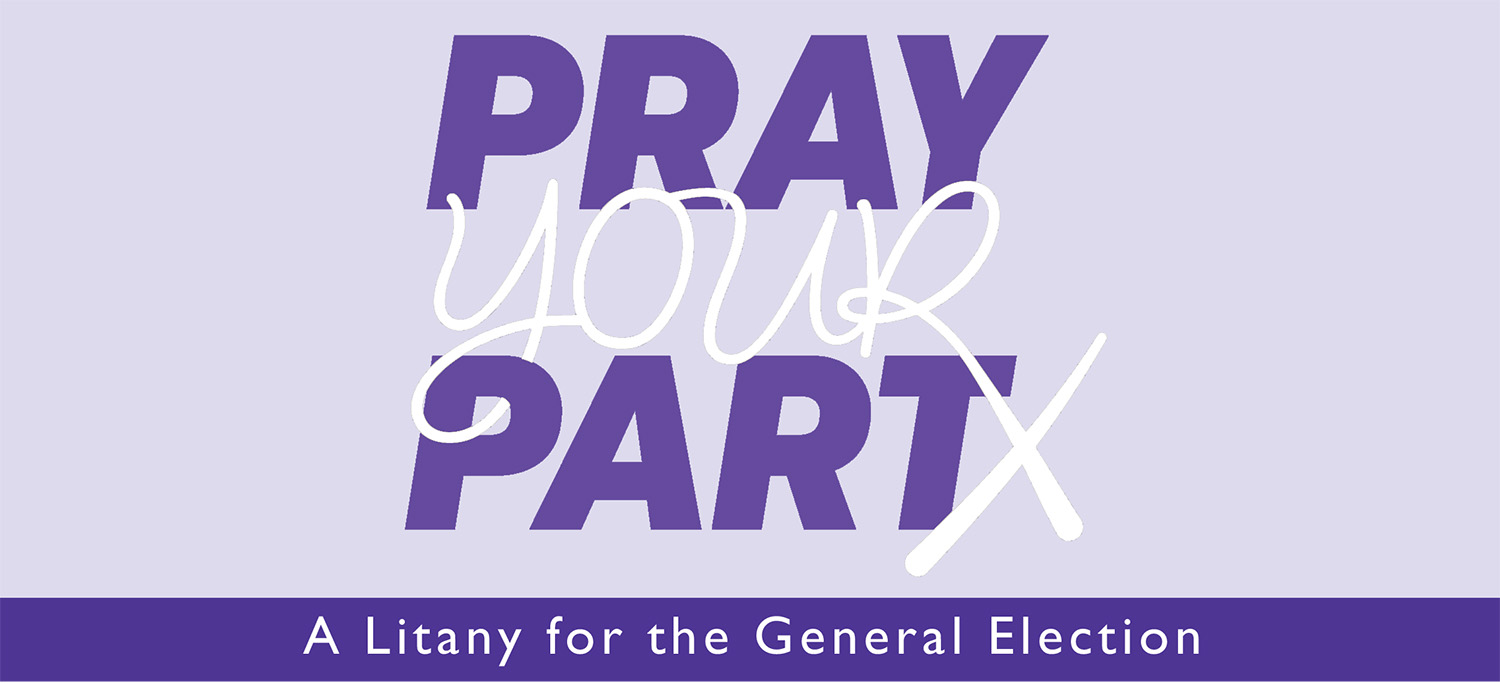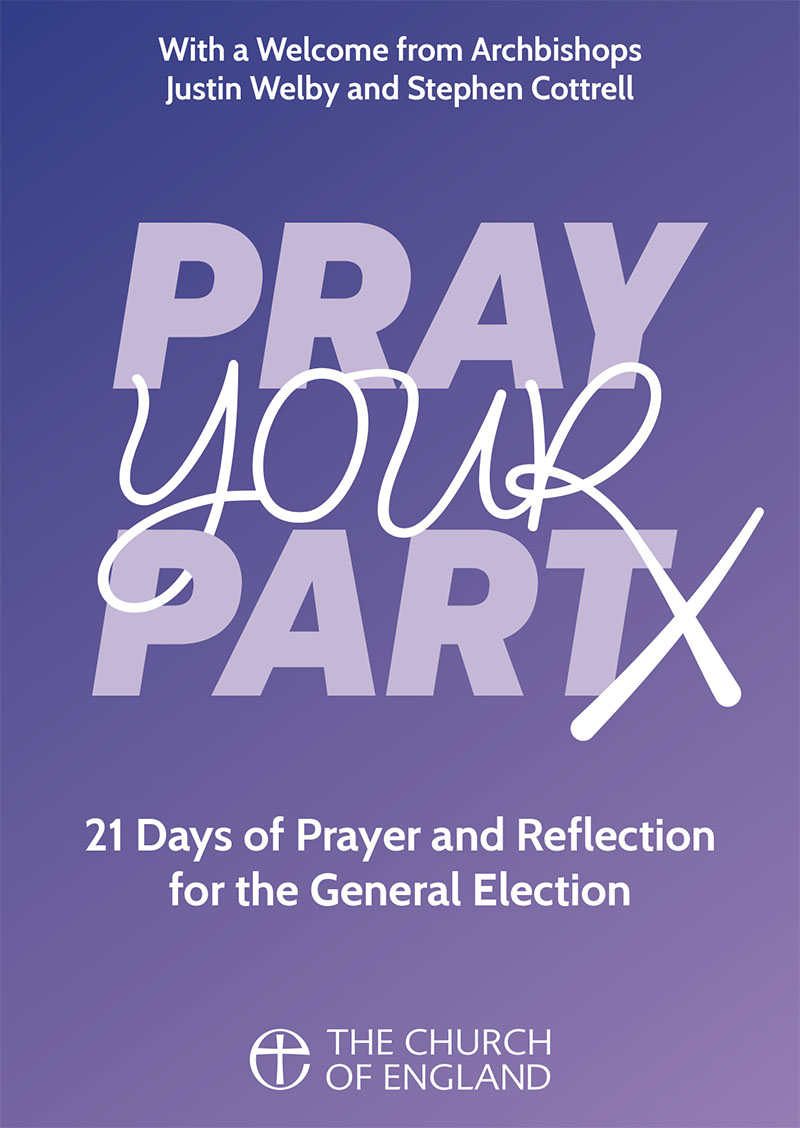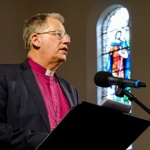How to pray for the General Election
Bishop Steven gave the following speech as the presidential address for the Oxford Diocesan Synod meeting on 8 June.
The United Kingdom is less than four weeks away from a General Election, being held on Thursday 4 July. Every election is potentially a crossroads moment in our national life. The world faces multiple challenges, as does our country. How should we as the Church and as the established Church in England respond in this moment?
A crossroads for the nation
A few hours after the Prime Minister called the election on the steps of 10 Downing Street, the bishops of the Church of England issued a call to put prayer and participation at the heart of the General Election campaign. Archbishops Justin and Stephen said together:
“We are facing epic challenges both in our country and in our world: from questions of war and peace, to poverty and injustice and the very future of the Earth God has given to us.
“Faced with such huge questions, our instinct as Christians is to turn to God in prayer, and so we want to put prayer at the very heart of this campaign.”
“We are therefore inviting everyone who is willing to dedicate the next few weeks as a time not just to think about the big question but to pray for our nation and our world. And we want to invite everyone to think about how we can all play our part both as voters and, more broadly, as citizens.”
I want to reflect on what that call to prayer might mean at this moment. Why is the Church called to pray during a General Election? What are we to pray for? How should we pray and fulfil this part of our calling in the coming weeks?
A biblical call
The call to pray for our own nation and for the world is deeply embedded in the Scriptures. This is a biblical call. Psalm 72 is one of many psalms focussing on intercession for the king, and through the king the wise government of the nation. The psalm begins:
“Give the king your justice, O God, and your righteousness to a king’s son;
May he judge your people with righteousness and your poor with justice.”
– Psalm 72.1
What does the Psalm encourage us to pray for the king? For justice in the ordering of national life and priorities; for safety and security in an uncertain world; for prosperity and economic security; for the natural environment, and for the health of the king and for the nation. It’s a good place to begin.
This prayer for the nation is extended beyond God’s chosen people by the prophet Jeremiah. When the leaders of the nation are taken into captivity in Babylon, Jeremiah writes a letter to the exiles. In it the prophet commends prayer for the shalom, the peace of their new city:
“But seek the welfare of the city where I have sent you into exile, and pray to the Lord on its behalf, for in its welfare you will find your welfare.” – Jeremiah 29.7
The Book of Chronicles looks back from after the exile to the founding of the temple and to God’s word to Solomon: the call to God’s people to set humility, repentance and prayer at the heart of the life of the nation:
“… If my people who are called by name humble themselves and seek my face and turn from their wicked ways, then I will hear from heaven, and will forgive their sins and heal their land.” – 2 Chronicles 7.14
Prayer changes things
God does not call his people to activities which have no purpose. Prayer really changes thing. Prayer contributes to the health and wellbeing of the nation. Prayer expresses what we most deeply long for and value. Prayer can change us and give renewed perspective. Prayer can affect the course of history. Will we heed this call to prayer at this time?
The New Testament writers lean back into this rich tradition of intercession in the Old Testament and are clear that Christians have a responsibility to be good citizens, engaged and participating in wider affairs. This is Paul in Romans:
“Let every person be subject to the governing authorities; for there is no authority except from God, and those authorities that exist have been instituted by God… For the same reason you pay taxes for the authorities are God’s servants, busy with this very thing.” – Romans 13.1, 6
This responsibility to engage under the empire translates well to a responsibility to engage well in a democratic society, especially in a time of election. 1 Timothy is clear that a central part of that responsibility is to intercede for our nation regularly and faithfully. This is to be a clear priority for the Church:
“First of all then, I urge that supplications, prayers, intercessions and thanksgivings should be made for everyone, for kings and all who are in high positions, so that we may lead a quiet and peaceable life in all godliness and dignity.”
– 1 Timothy 2.1-2
Prayer for the nation
Prayer for the nation should be a normal part of our intercessions, both private and public. We have a particular responsibility as the established church to pray for the whole of our society, for local and national government and parliament and for the royal family.
I have to say that I observe a variety of practice in prayers of intercession as I visit different churches Sunday by Sunday. Often they are carefully prepared and very well led, rich, well informed by LLMs and lay members of congregations.
Sometimes they are brief and perfunctory and domestic to the life of the church, barely lifting the eyes of the congregation beyond their own concerns. Sometimes the intercessions seem to be addressed to the congregation rather than to God, an alternative sermon rather than heartfelt prayer.
Our public and our private intercessions matter deeply. They should be carefully thought about and well prepared, especially in this season when many may come in and join us in prayer for the nation.
We all pray for individuals in moments of great crisis and decision: students taking exams; those who are facing life crises and changes of career. If we pray for individuals in times of great crisis and decision then how much more should we pray for our democracy in this great act of corporate discernment which is a General Election: for the well being of our land; for justice; for safety and security; for economic prosperity; for the environment.
Pray your Part
So how should we then pray at this time? What resources do we need? The national Church of England resource for this season is called Pray your Part. Pray your Part is a 21-day focus on prayer for the election prepared by a group of bishops for the whole Church to use at this time. The 21 days begin on Friday 14 June and continue until 5 July, the day following the General Election.
For each day we are given a theme, a short bible passage, a reflection and a prayer. The prayers build together into a litany for the General Election which I hope will be used in parishes over the coming three Sundays. The resources are available as a short booklet which can be ordered in bulk, they are available on the Church of England campaigns app, by email in written and audio format, and on your smart speaker. They will form the basis of a social media campaign across the 21 days with video and audio clips from a variety of people as together we pray for the nation.
Let me highlight two aspects of these resources as I commend them to you.
The Lord’s Prayer
The first is to flag their relationship to the Lord’s Prayer. The Lord’s Prayer is itself a tremendous resource as we pray for this General Election.
The first line of the prayer reminds us that all authority in earth and heaven belongs to God, draws us back to humility before God and gives us perspective on the world. The second line of the prayer is the wellspring for our election litany: your kingdom come, your will be done on earth as it is in heaven.
This line of the prayer echoes Psalm 72. Our Lord, the king, teaches us to pray in the values of his kingdom. We are praying beyond party and narrow political interest for God’s justice to be done and God’s vision for our national life to be realised.
‘Give us this day our daily bread’ challenges our greed and helps us to pray for a right relationship with creation. ‘Forgive us our sins as we forgive those who sin against us’ takes us back to Chronicles and the need for repentance and change, and also for renewed community cohesion.
‘Lead us not into temptation but deliver us from evil’ reminds us of the many challenges which face the world and face the nation and cries out for God’s help. We cannot manage by ourselves but need God’s guidance and wisdom and grace. ‘For yours is the kingdom, the power and the glory’ helps us to overcome our own anxieties and fears and entrusts the nation and our own lives into the hands of our merciful, loving Father in heaven.
The Lord’s Prayer blows the doors of our hearts wide open to God’s perspective on our world and gives us words to pray in this season.
Pray together for the common good
The second resource is the General Election litany. Litanies are sequences of short petitions and responses which enable congregations to pray together for the common good. This is not a small thing in a town or village or parish church where political opinion may be divided. Litanies go back to the psalms (Psalm 136 is an excellent example with its refrain “May his mercy endure for ever”).
The use of litanies in the Church goes back to the fourth century in the Eastern Church. Shorter and longer litanies are one of the treasures of Anglican liturgical life. When we don’t understand quite how to pray, we lean back together into words which others have formed to give shape to our own intercessions.
This litany for the General Election draws on some familiar petitions from Anglican litanies and coins some new petitions. Over 21 prayers the words will help us pray for every aspect of our national life and of this election: for the health service, for schools, for the environment, for the armed forces, for candidates, for the economy, for housing and so on.
I commend the litany for use across the diocese over the coming Sundays so that we can pray together at this key moment in the life of the nation. I commend the litany for the daily prayers of individuals and the daily prayers in parish churches.
God’s people
So let prayer and participation be at the heart of this General Election campaign. We are privileged to live in a democracy. All Christians have a responsibility to participate as citizens by engaging with the themes of the campaign, by turning out to vote in the election, by raising the issues of justice and peace and the environment through hustings. The diocese have brought together key resources to help local churches engage through arranging hustings and participation through the website.
But above everything else, as God’s people, let us put prayer and intercession at the heart of our nation: to cry out to Almighty God, our Father in heaven, for our nation and our world in this moment and to seek God’s grace. Pray your part in this election.
“… If my people who are called by name humble themselves and seek my face and turn from their wicked ways, then I will hear from heaven, and will forgive their sins and heal their land.”
– 2 Chronicles 7.14
Pray your Part
So how should we then pray at this time? What resources do we need? The national Church of England resource for this season is called Pray your Part. Pray your Part is a 21-day focus on prayer for the election prepared by a group of bishops for the whole Church to use at this time. The 21 days begin on Friday 14 June and continue until 5 July, the day following the General Election.
For each day we are given a theme, a short bible passage, a reflection and a prayer. The prayers build together into a litany for the General Election which I hope will be used in parishes over the coming three Sundays. The resources are available as a short booklet which can be ordered in bulk, they are available on the Church of England campaigns app, by email in written and audio format, and on your smart speaker. They will form the basis of a social media campaign across the 21 days with video and audio clips from a variety of people as together we pray for the nation.
Let me highlight two aspects of these resources as I commend them to you.
The Lord’s Prayer
The first is to flag their relationship to the Lord’s Prayer. The Lord’s Prayer is itself a tremendous resource as we pray for this General Election.
The first line of the prayer reminds us that all authority in earth and heaven belongs to God, draws us back to humility before God and gives us perspective on the world. The second line of the prayer is the wellspring for our election litany: your kingdom come, your will be done on earth as it is in heaven.
This line of the prayer echoes Psalm 72. Our Lord, the king, teaches us to pray in the values of his kingdom. We are praying beyond party and narrow political interest for God’s justice to be done and God’s vision for our national life to be realised.
‘Give us this day our daily bread’ challenges our greed and helps us to pray for a right relationship with creation. ‘Forgive us our sins as we forgive those who sin against us’ takes us back to Chronicles and the need for repentance and change, and also for renewed community cohesion.
‘Lead us not into temptation but deliver us from evil’ reminds us of the many challenges which face the world and face the nation and cries out for God’s help. We cannot manage by ourselves but need God’s guidance and wisdom and grace. ‘For yours is the kingdom, the power and the glory’ helps us to overcome our own anxieties and fears and entrusts the nation and our own lives into the hands of our merciful, loving Father in heaven.
The Lord’s Prayer blows the doors of our hearts wide open to God’s perspective on our world and gives us words to pray in this season.
Pray together for the common good
The second resource is the General Election litany. Litanies are sequences of short petitions and responses which enable congregations to pray together for the common good. This is not a small thing in a town or village or parish church where political opinion may be divided. Litanies go back to the psalms (Psalm 136 is an excellent example with its refrain “May his mercy endure for ever”).
The use of litanies in the Church goes back to the fourth century in the Eastern Church. Shorter and longer litanies are one of the treasures of Anglican liturgical life. When we don’t understand quite how to pray, we lean back together into words which others have formed to give shape to our own intercessions.
This litany for the General Election draws on some familiar petitions from Anglican litanies and coins some new petitions. Over 21 prayers the words will help us pray for every aspect of our national life and of this election: for the health service, for schools, for the environment, for the armed forces, for candidates, for the economy, for housing and so on.
I commend the litany for use across the diocese over the coming Sundays so that we can pray together at this key moment in the life of the nation. I commend the litany for the daily prayers of individuals and the daily prayers in parish churches.
God’s people
So let prayer and participation be at the heart of this General Election campaign. We are privileged to live in a democracy. All Christians have a responsibility to participate as citizens by engaging with the themes of the campaign, by turning out to vote in the election, by raising the issues of justice and peace and the environment through hustings. The diocese have brought together key resources to help local churches engage through arranging hustings and participation through the website.
But above everything else, as God’s people, let us put prayer and intercession at the heart of our nation: to cry out to Almighty God, our Father in heaven, for our nation and our world in this moment and to seek God’s grace. Pray your part in this election.
“… If my people who are called by name humble themselves and seek my face and turn from their wicked ways, then I will hear from heaven, and will forgive their sins and heal their land.”
– 2 Chronicles 7.14




